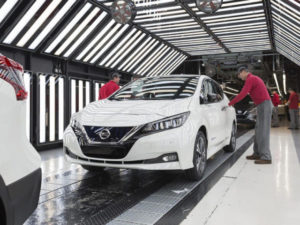UK car manufacturing rises 1.3% in May
UK car production was up 1.3% in May but still remains down year on year.

UK car manufacturing rose 1.3% in May, with 137,225 units produced.
The figures from the Society of Motor Manufacturers and Traders (SMMT) show a total of 137,225 cars were built in British factories last month, following a marked decline in the same month last year when several plants adjusted production schedules to prepare for a raft of new and updated models.
Output for the domestic market was up 12.8%, cancelling out a decline of exactly the same percentage this time last year due the VED reforms. Production for export dipped by 1.5% last month, with 107,307 cars destined for overseas markets and making up 78.2% of UK automotive production.
For the year-to-date, production remains down by 2.9%, standing at 705,603 units.
The figures have been published just days after the organisation urged the UK government to rethink its position on a customs union as it said that UK car industry investment for the first six months of the year had halved from the same period in 2017.
Commenting on May’s UK car production growth, Mike Hawes, SMMT chief executive, said: “For this to continue, we need to ensure UK car plants are able to attract future investment, and this will depend upon maintaining the competitive conditions that have helped drive the industry’s success in recent years. Given our dependency on the EU as our biggest customer and supplier, that means retaining the benefits of the single market and membership of the customs union – the minimum requirement for frictionless trade.”
Alex Buttle, director of car buying comparison website Motorway.co.uk, said: “Consumer confidence needs a boost to get domestic demand back on track, or we’re at the mercy of the EU and unknown trade deals.
“The dangers of our over reliance on the export market were brought home this week when BMW warned about the consequences of Brexit uncertainty.
“Relying on exports to prop up flagging UK demand is not a strong position to be in when we are trying to negotiate favourable EU trading conditions.”













